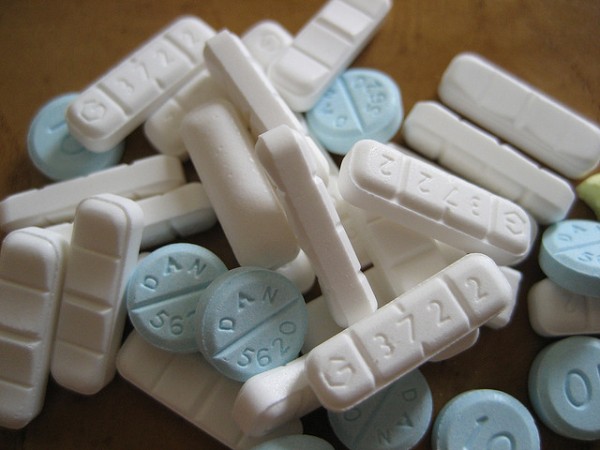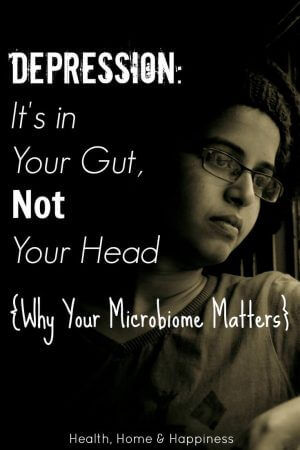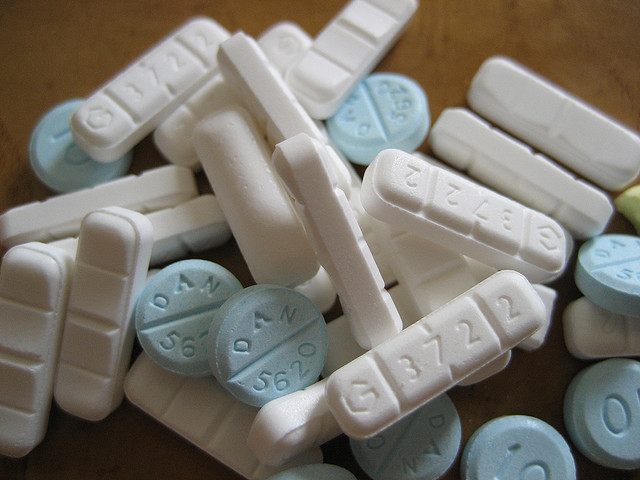
As it affects about one tenth of the population, people are catching on that depression isn’t something that people can just will to go away, or snap out of. Though situational depression can be caused by a temporary situation, in general depression is something that points to an overall imbalance in the body.
It’s thought that it is a deficiency of the brain or body, and the chemicals that the brain is getting just aren’t quite right.
And that’s true. But this isn’t just genetic, a glitch in a person’s makeup, or something that some people develop randomly.
We’ll look into depression more below, and then I’ll share some unexpected fixes and where to find more information about fixes that heal the whole body (and clear up things like eczema and digestive issues on the process- that’ll beat cotton mouth any day) rather than drug fixes that harm the body.
What is depression?
Lasting longer than a few days of feeling sad or mopey, depression is defined as sadness that interferes with work, sleep, eating, and/or enjoying life’s activities. Major depressive episodes are more severe, but short term. Persistent depressive disorder lasts for 2 years or longer. Seasonal affective disorder and postpartum depression are both tied to a certain timeperiod.
Did you know?
It can be considered depression if you have some of the following symptoms:
- Have feelings of helplessness or hopelessness
- Have reckless behavior
- Think of suicide
- Have loss of energy
- Sleep too little or sleep all the time
- Eat too little or can’t stop eating
- Can’t control negative thoughts, even if you try to
- Don’t enjoy things that you previously did
What are conventional treatments for depression?
Most people who are depressed do not get treatment for it. This may be because the treatment often prescribed has undesirable side effects, or is expensive or not all that effective.
Exercise and eating ‘well’ is the simple conventional advice. The endorphins from exercise do help many people stabilize their mood, but many people with depression find that exercise is not enough. Eating ‘well’ is subjective – Below I’ll tell you about a specific healing diet that helps with depression, it’s not quite as simple as following the food pyramid and other conventional nutritional advice. But it’s not all that complicated either – it’s worth it to check it out.
Counseling and therapy can help people work past issues. Yes, emotional processing is also an important part of healing, and this does help many people. But again, when there is a chemical problem in the body, this is not quite enough.
In addition to therapy, antidepressants are often prescribed.
Common antidepressants include:
- SSRIs like Zoloft, Paxil, and Procaz are the most commonly prescribed, and have the least amount of side effects, though they do often impact the sex drive. They work by reducing the seratonin blockers in the brain.
- SNRIs like Cymbalta and Effexor improve seratonin and norepinepherine levels in the brain.
- TCAs like Tofranil, Vivactil, and amoxapine have more serious side effects and work when other antidepressants don’t work. They
Are conventional treatments for depression working well?
In short, no. Talk to anyone on antidepressants, and they are well aware of the side effects of them. They also often have to get doses adjusted, are on the wrong medication, and have to try a bunch of different meds before finding one that seems to help.
Side effects of antidepressants:
- Nausea
- Increased appetite and weight gain
- Low sex drive, sexual problems (this is often overlooked, especially with women, but a healthy person should have a healthy sex drive)
- Insomnia
- Fatigue
- Dry Mouth
- Constipation
- Involuntary movements
- Increased risk of suicide
How does what I eat affect how I feel?
There are a few ways that the gut is involved in depression.
- First, the gut (and really our whole body) is lined with a colony of bacteria. When the body is healthy and working well, we have beneficial bacteria that keep the opportunistic pathogenic bacteria held back. The beneficial bacteria also work with the wall of the gut to make enzymes for food digestion, stimulate cell regeneration, and help with immune function.
- Our good bacteria are able to crowd out the bad bacteria before they take root, much like a ground cover in your yard crowds out the weeds and prevents them from taking hold. When this balance of good-to-bad bacteria is off, the bad bacteria take over our guts.
- With this, the bad bacteria actually secrete chemicals as part of their metabolic process. These chemicals go through the gut wall and into the bloodstream, and can act like drugs in our brain. This can manifest as intense sugar cravings, brain fog, depression, or, as we’re talking about today, depression.
- This has been talked about in published journals:
- Second, there is brain tissue in your gut. There are about 500 million neurons (source) in your gut. These neurons help control your digestion, and they also work with your brain for your physical and mental well being.
- Third, lack of nutrients being absorbed by your gut create nutrient deficiencies in your body. When the body does not have the nutrients it needs to run the all-powerful brain, some systems get out of whack.
- Fourth, because so much of the detoxification system of our body is housed in our gut, when our gut health is not in good shape, we get a backup of toxins. Like the pathogenic bacteria, these toxins can once again re-enter the bloodstream, and affect our brain. In a healthy gut mild toxin exposure is easily accommodated for by the body, but in a damaged gut, we are unable to detoxify as well.
You can hear more about the gut-brain connection by signing up for the free interview series – The Depression Sessions – by clicking here.
How did our guts get so messed up?
Eating more and more processed foods, antibiotics being prescribed so often, toxins in our water, fluoride in our toothpaste, lack of the fats needed to build cells, chemicals sprayed in the air to give it a ‘fresh clean scent’, pollution… It’s a wonder that we’re still here! Our skyrocketing chronic conditions are telling us THIS IS NOT WORKING.
We need to change. While a round of antibiotics might have been life-saving for your great-grandpa, it has detrimental effects on gut health, and over generations, our microbiome has become too compromised. We need to be careful with what we eat, what we breathe, and what we’re exposed to. This didn’t happen overnight, and it won’t be fixed overnight, but we can start taking the steps to change right now.
So I want to heal my gut and get rid of depression from the root – where do I start?
There are some natural supplements that don’t have the gut-harming side effects that conventional antidepressants do that can free up some of your emotional energy to get ready to tackle a gut-healing protocol. Some that many people find useful (I would try just one at a time, be sure to research on your own before taking, I am not a medical professional): 5HTP, Gaba, Sam-E, St John’s Wort, Valarian Root, a B-complex using mythlated folate, and Elevation essential oil blend.
We also need to make healthy changes to our homes and reduce our toxic load – these are pretty basic steps but can make a big difference. Click here to get a free printable checklist for a 30-day plan to get this started in simple steps
Next, we try an elimination diet. It’s so common that removing foods that often are allergy-causing, inflammation-causing, and cause a leaky gut. Removing dairy and/or gluten will most often relieve symptoms drastically. And then we can work our way back to really healing our gut with the GAPS diet. (click here for more information on working backwards to the GAPS diet)
Then once we are stabilized and eliminating common allergens from our diet, we can work on restoring gut flora balance and healing the gut. Most importantly, we clean up the gut. (click here for the GAPS intro diet for gut healing and sealing)
Probiotics can help, be sure to go slow – we’ll be introducing these beneficial bacteria, which will in turn kill off the bad ones – when this happens we can experience a rush of symptoms, so it’s important to go slowly (these are the probiotics that I use)
When the gut flora is balanced, we should crave healthy food, have a fairly stable mood, and feel nourished.
We don’t have to choose between feeling sad and helpless and taking meds that give us other symptoms. By cleaning up the gut, we clean up our mood. In addition, this isn’t only about mood. Having a negative outlook increases our morbidity from other diseases as well (source).
Getting well is important, there is hope.
Learn more about naturally correcting imbalances rather than using SSRIs to cover up the underlying problem by clicking here.
Other posts in this series
Let me tell you exactly why all the problems start in the gut!
- The Gut-Anxiety Connection
- The Gut-Picky Eating Connection
- The Gut-Autism Connection
- The Gut-ADD Connection
- The Gut-Eczema Connection
- The Gut-Brain Connection

Learn how to heal leaky gut

60-page ebook of all my best GAPS Diet (Gut and Psychology Syndrome) articles all in one place.




That’s a whole lot of info to take in all at once. Do you have a beginners version?
I wish I did! It is complicated – I’d suggest printing or bookmarking and just reading or researching one part at a time?
In this article, I don’t see one mention of consulting with your primary care physician or family doctor here before attempting to self-medicate. That’s very dangerous. Depression isn’t something to trifle with.
I don’t have a problem with people trying some of the proposed solutions (although their value would need to be measured over time in conjunction with placebos to see if they actually do anything), but going off your doctor-prescribed medication to start taking essential oils is a very bad idea.
I remind people that I am not a medical professional in the article, and I also nowhere recommend that anyone stop taking doctor-prescribed medication. This, and all my articles, are for informational purpose only, and are not to be taken as medical advice.
Notice she is not recommending to SELF MEDICATE! These are not meds. We need to change our thoughts that everything can not be solved with a PILL. VItamins and supplements are Natural occurring parts that make the different and dont take an RX to get it. My son and myself have benefited SO MUCH from this diet. It works…but you have to be able to make the commitment and stop eating “cheap” and for taste only. Eat for life….eat healthy!
There is an awesome session coming up from Sean Croxton: thedepressionsessions.com. Sean has already sent out 2 or 3 tidbits from the awesome speakers that will be featured. I listened to his digestion sessions (last year, I believe) and they were amazing!! You have two days to listen to each set of talks, then they are gone. But you can buy a bundle of all of them, plus extras.
Yes! I have it linked in the article, it’s a fantastic resource. Thanks for reminding us :)
Hi Cara. This is one of the best article on depression i have read. Succinct clear and to the point with excellent helpful tips that are easy to follow. I am in the process of recording some interviews with amazing people from all of the world for my podcast and i wonder if you’d be intereted in finding out some more and if you might be up for an interview?
Many Regards Bill
I’ll email you, Bill, I’d love to be on your podcast.
Hi Bill, I need a personal help/ advice that I can not found an answer anywhere… Depression during 10 years from my adult kids, restriction to see grandkids Please contact me taty
JD has a good point, but…
People need to realize that many doctors do not recognize natural/homeopathic remedies as effective medicine. This is because the modern medical system is slanted toward the use of pharmaceuticals and keeping you chained on them. (It’s all about money)
If your body is in the grip of severe disease, you probably need allopathic and pharmaceutical medicine under the direction of a primary care physician. But if you’re like me (most of us are), and you’re just slightly over weight, low on energy, slightly high blood pressure, etc… Then these natural methods are the way to go.
Hi Cara
Thanks for the article. A lot of good food for thought. I did want to share my experience with St. John’s wort, though. I took it regularly several years ago to help with a bout of seasonal depression. After about a month, I start having difficulty with my vision and fine motor skills (unable to tie shoes, etc. – I was in my 20s at the time). Come to find out, SJW can cause demyelination. I stopped taking it and my symptoms improved and then disappeared. The experience really hit home for me that natural remedies can have major impacts (potentially for the good or the bad, just like pharmaceuticals can) and it’s very important to thoroughly research any potential treatments. If a friend hadn’t told me about SJW and demyelination, I doubt I ever would have attributed my problems to it. I don’t know if it could/would have caused irreparable damage, but I definitely would urge caution when using it.
Thanks for sharing that Amy, yes, it is important to be cautious with natural remedies as well! I’ll go add a warning to the post too.
I started the Gaps yesterday to heal my depression , can’t wait till I’m better thanks for the hope!
Hi, what about if you can’t stop eating the dairy or gluten? I have been trying for years and I can never go longer than a few days to maybe a couple weeks and then I can’t stop myself. I generally eat well and exercise. I am not overweight. Follow most healthy guidelines as far as natural products and buying food directly from farm or organic. I’m very depressed and have excessive worry about the future. I get extremely stressed out thinking about driving in the snow or extreme rain. I worry about when my kids grow up etc… Do you have a suggestion for someone struggling with actually incorporating the restrictions. I gave up for awhile, but honestly I’m tired of living like this. Thank you for your time.
Hi Lizabeth, you might try a probiotic. Being addicted to gluten/dairy isn’t really uncommon either, you can read more here. https://healthhomeandhappiness.com/why-does-my-child-seem-addicted-to-dairy-andor-wheat.html
Getting something to work will improve your quality of life by quite a bit :)
Thank you! I have tried numerous probiotics! The ones from gaps, metagenics, including very expensive ones $50’a month numerous times! This is when I actually seem to crave the gluten and dairy more and usually end up eating more of it. :/ I have also tried Kombucha, and fermented veggies. Thanks for your suggestion I will read it now!
Hi Cara, have you urself trouble from depression as I have myself but I had to try eat meat daily with rice, so is fermented food alternate to carnivore, if I take fermented food with ghee.